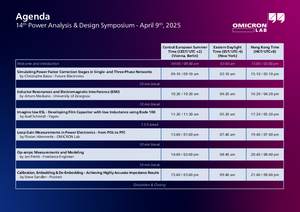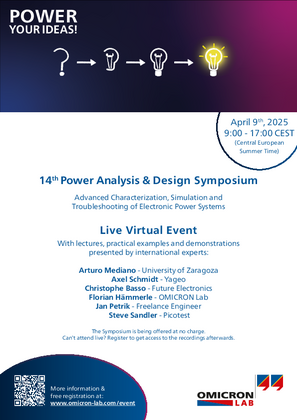14th Power Analysis & Design Symposium 2025 (VIRTUAL)
The OMICRON Lab Power Analysis & Design Symposium is an annual event focusing on advanced characterization, simulation, and troubleshooting of board-level power-electronic systems. International experts from the field include practical examples and demonstrations in their lectures.

14th Power Analysis & Design Symposium
Advanced Characterization, Simulation and
Troubleshooting of Electronic Power Systems
The 14th Power Analysis & Design Symposium took place as a live, virtual event on Wednesday, April 9th, 2025.
No matter if you had time to attend the symposium or not, for your convenience we made all presentations available.
Below you will find the PDF files for each presentation. The video recordings will be available soon.
Seminar Topics
Simulating Power Factor Correction Stages in Single- and Three-Phase Networks
by Christophe Basso - Future Electronics
In this 60-minute seminar, you will learn the basics of power factor correction and discover how the power is processed in single- and three-phase applications. Illustrated with many examples in SIMetrix/SIMPLIS and LTspice, the presentation is well-suited for students and power designers involved in the design of PFC circuits.
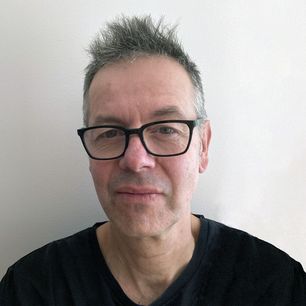
Inductor Resonances and Electromagnetic Interference (EMI)
by Arturo Mediano - University of Zaragoza
Inductors are one of the essential components in the design of any electronic system, alongside capacitors. They come in various types, including air-core and magnetic-core inductors, and are utilized in low-signal applications as well as in power electronics. Inductors play critical roles in the design of filters, impedance matching networks, DC/DC converters, oscillators, and more. However, inductors are not ideal components. Their resonant frequencies can pose significant challenges, particularly in the context of Electromagnetic Compatibility (EMC) and EMI design. These resonances can lead to unintended oscillations or issues, which are often complex and challenging to diagnose. In this session, we will introduce the nature of these resonant frequencies, exploring how they can be measured and modeled in a basic form. We will also present some examples illustrating the critical problems that arise when attempting to achieve designs compliant with EMC standards. Understanding these resonances is vital for developing robust electronic systems that minimize interference and optimize performance.
Join us as we uncover the intricacies of inductor behavior and its impact on EMI, and learn strategies for effective design that ensure electromagnetic compatibility.

Imagine low ESL - Developing Film Capacitor with low Inductance using Bode 100
by Axel Schmidt - Yageo
Power applications go along with high currents. Wideband technology allows higher switching frequencies. Together, this requires a special focus on the low inductance of the whole system. The topic of the investigation with Bode 100 is how a vendor develops low inductance components, what are the set screws to achieve a low ESL component, and how to build simulation models for the higher sophisticated SPICE software.
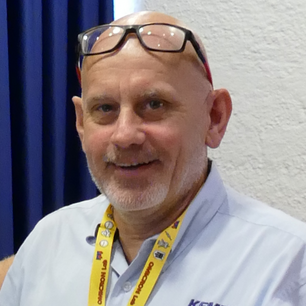
Loop Gain Measurements in Power Electronics - from POL to PFC
by Florian Hämmerle - OMICRON Lab
This presentation provides an overview of performing loop gain measurements in power electronic applications. Different probing and injection methods apply depending on the power or voltage level. Selecting the injection point is critical in a loop gain measurement since a wrong injection point can falsify the measurements. In the best case, you consider the injection point during the design phase to simplify the lab measurements used for experimental verification.
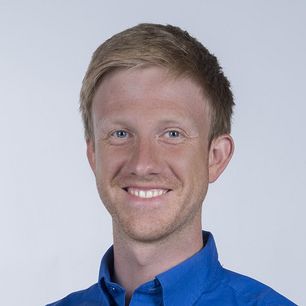
Op-amps: Measurements and Modeling
by Jan Petrik - Freelance Engineer
The presentation will introduce you to a wonderful world of op-amps, measurements, and SPICE modeling. It will show you how to perform the necessary measurements with Bode 100. And how to use acquired data to construct your own stability model in LTspice. The use and benefits of the stability model will be demonstrated.

Calibration, Embedding and De-Embedding – Achieving Highly Accurate Impedance Results
by Steve Sandler - Picotest
Accurate measurements rely on proper calibration of the test setup to the correct reference plane. Traditional Vector Network Analyzers (VNAs) offer a variety of methods for embedding, de-embedding, and calibration to achieve high measurement accuracy. However, the Bode 100 and Bode 500 VNAs require unique approaches to obtain optimum results.
In this session we will explore calibration techniques, including embedding and de-embedding, for both traditional VNAs and the Bode 100/500. We’ll highlight common sources of measurement errors, such as challenges introduced by using probes or soldered pigtails instead of RF connectors. Additionally, we demonstrate how to establish and shift the calibration reference plane to support SPICE and EM models.
While perfect measurements are unattainable, employing the appropriate calibration, embedding, and de-embedding techniques significantly enhances the accuracy of impedance measurements. This is especially critical for low-impedance, low-frequency applications, including capacitor ESL, small capacitances like inductor self-resonance, PCB traces, PDN impedance, and RF applications.
Get to know the Experts

Christophe Basso is a Business Development Manager at Future Electronics in Toulouse, France, covering EMEA. Previously, at Onsemi, he led an application team dedicated to developing new offline PWM controller’s specifications. He has originated numerous integrated circuits among which the NCP120X series has set new standards for low standby power converters. He holds 25 patents on power conversion.
Christophe has published numerous books on power supply design and, in particular, small-signal modeling with his title from 2021, Transfer Functions of Switching Converters. He taught many public and private seminars world-wide but also during the IEEE-sponsored conference APEC in the US.
Christophe has over 25 years of power supply industry experience. Prior to joining Future Electronics in 2021, Christophe was a Technical Fellow at Onsemi and an application engineer for Motorola Semiconductor in Toulouse. Before 1997, he worked at the European Synchrotron Radiation Facility in Grenoble, France, for 10 years. He holds a diplôme universitaire de technologie from Montpellier University (France) and an MSEE from the Institut National Polytechnique of Toulouse (France). He is an IEEE Senior member.

Arturo Mediano is the founder of The HF-Magic Lab®, a specialized laboratory for design, diagnostic, troubleshooting, and training in the EMI/EMC, Signal Integrity, and RF fields at I3A (University of Zaragoza).
He received his M.Sc. (1990) and his Ph. D. (1997) in Electrical Engineering from the University of Zaragoza (Spain), where he has held a teaching professorship in EMI/EMC/RF/SI since 1992.
For more than 30 years Arturo has been involved in R&D projects with many companies in the EMI/EMC, Signal Integrity and RF fields for communications, industry, medical, and scientific applications. He regularly shares his knowledge and expertise with students and engineers in teaching courses and seminars.
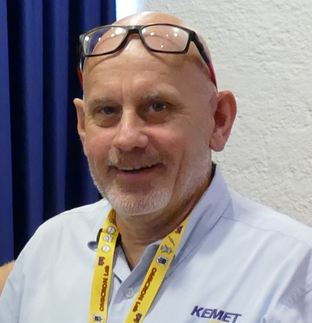
Axel Schmidt received a bachelor’s degree from University of Applied Science of Bochum, Germany and has more than 25 years of experience in passive components. He works for more than 17 years as a Field Application Engineer for KEMET Electronics a world wide manufacturer of capacitors. In this role he is working with German car makers ( AUDI, BMW Daimler and VW ) as well as with semiconductor companies around Munich (Infineon, TI, Analog, ON Semi) evaluating designs together with customers. Axel delivers in addition lectures at University of Applied Science Kufstein, Austria for smart product solutions.
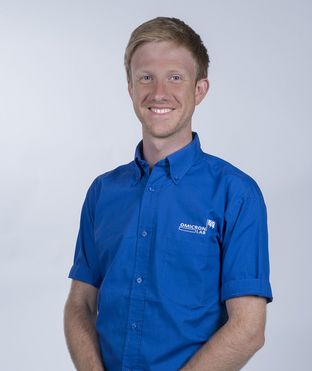
Florian Hämmerle went to the Bregenz Electrical Engineering College (HTL). After that, he studied Mechatronics at the University of Applied Sciences Vorarlberg (FHV), where he carried out his Master thesis "Simulation and Characterization of a Miniaturized Planar Coil" at the Research Center for Microtechnology.
Since 2010, Florian is working at OMICRON Lab with a strong focus on power electronics applications for the Bode 100 VNA.

Jan Petrik is a hardware engineer with more than 9 years of experience in hardware design. He graduated with honors from Czech Technical University in Prague in 2013. Since then, Jan has gained his experience working mostly in medical and aerospace industries. He is passionate about analog electronics, power integrity, EMC and circuit simulations. Jan enjoys figuring out complexities of quality hardware design, that stand the tests of EMC chamber, mass production and time. Since 2021, he has been freelancing, offering design and consultancy services. When not in his laboratory, Jan enjoys spending time with his family and climbing. He enjoys learning new stuff, sharing accumulated knowledge and quality discussion.
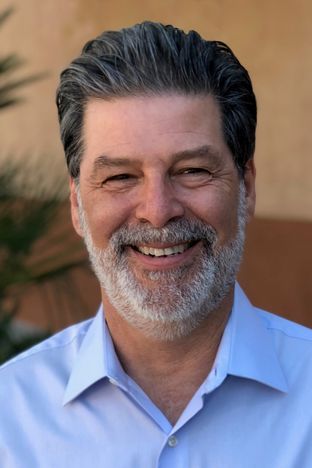
Steve Sandler has been involved with power system engineering for nearly 40 years. Steve is the founder of Picotest.com, a company specializing in instruments and accessories for high performance power system and distributed system testing. He frequently lectures and leads workshops internationally on the topics of Power Integrity, PDN, and Distributed Systems and is a Keysight Certified EDA expert. Steve publishes articles and books related to power supply and PDN performance. His latest book, “Power Integrity: Measuring, Optimizing and Troubleshooting Power-Related Parameters in Electronics Systems” was published by McGraw-Hill in 2014. He is the recipient of the ACE 2015 Jim Williams Contributor of the Year ACE Award for his outstanding and continuing contributions to the engineering industry and knowledge sharing. Steve is also the founder of AEi Systems, a well-established leader in worst case circuit analysis, modeling, and troubleshooting of satellite and other high reliability systems.
Agenda
| Time | ||||
| Topic | Speakers | Central European Time (CEST/UTC +2) (Vienna, Berlin) | Eastern Daylight Time (EDT/UTC-4) (New York) | Hong Kong Time (HKT/UTC+8) |
| Welcome & Introduction | OMICRON Lab | 09:00 / 09:00 am | 03:00 am | 15:00 / 03:00 pm |
| Simulating Power Factor Correction Stages in Single- and Three-Phase Networks | Christophe Basso - Future Electronics | 09:10 / 09:10 am | 03:10 am | 15:10 / 03:10 pm |
| Inductor Resonances and Electromagnetic Interference (EMI) | Arturo Mediano - University of Zaragoza | 10:20 / 10:20 am | 04:20 am | 16:20 / 04:20 pm |
| Imagine low ESL - Developing Film Capacitor with low Inductance using Bode 100 | Axel Schmidt - Yageo | 11:20 / 11:20 am | 05:20 am | 17:20 / 05:20 pm |
| Loop Gain Measurements in Power Electronics - from POL to PFC | Florian Hämmerle - OMICRON Lab | 13:40 / 01:40 pm | 07:40 am | 19:40 / 07:40 pm |
| Op-amps: Measurements and Modeling | Jan Petrik - Freelance Engineer | 14:40 / 02:40 pm | 08:40 am | 20:40 / 08:40 pm |
| Calibration, Embedding and De-Embedding – Achieving Highly Accurate Impedance Results | Steve Sandler - Picotest | 15:40 / 03:40 pm | 09:40 am | 21:40 / 09:40 pm |

